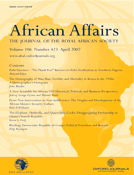-
Views
-
Cite
Cite
Kevin S. Fridy, The Elephant, Umbrella, and Quarrelling Cocks: Disaggregating Partisanship in Ghana’s Fourth Republic, African Affairs, Volume 106, Issue 423, April 2007, Pages 281–305, https://doi.org/10.1093/afraf/adl040
Close - Share Icon Share
Within the literature on Ghanaian partisanship, a healthy debate has arisen between those viewing Ghana’s two dominant parties as cleaved along socioeconomic lines and those suggesting that this cleavage runs along ethnic lines. Using election results, constituency maps, census data, and a survey of voters’ ‘cognitive shortcuts’, this article weighs in with the debate. The findings suggest that ethnicity matters in Ghanaian elections far more than socioeconomic variables. The findings do not, however, lead easily towards the gloomy predictions that often accompany ethnic politics. The relationship between ethnicity and partisanship in Ghana is far more complex. Data presented here suggest that Asante and Ewe voters are likely to vote for the New Patriotic Party (NPP) and National Democratic Congress (NDC), respectively, regardless of the candidates they select. Voters of other ethnic backgrounds, who make up the vast majority of Ghanaian voters, view the dominant parties as representative of Asante and Ewe interests but do not themselves vote as a block and base their evaluations of the ‘Asante’ and ‘Ewe’ parties ultimately on things other than ethnicity. It is this latter group of voters that makes Ghanaian elections unpredictable and discourages politicians from turning national votes into a zero-sum ethnic censes.







Comments